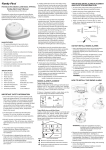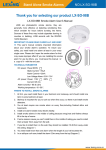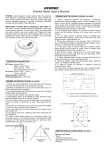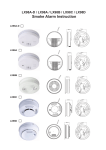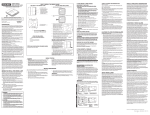Download SMOKE ALARMS - City of Meridian
Transcript
SMOKE ALARMS I get a false alarm from my smoke alarm. Why does my smoke alarm sound when I can't see smoke? Any of the following situations can cause a false alarm from your smoke alarm: • The cover or sensor chamber may be covered by dust or dirt. Alarms may look clean, but dust can accumulate inside the cover, even in newly built homes. Gently vacuum your smoke alarm regularly using the soft brush attachment. You can also use a can of air to blow out any dust accumulation. • Insects may have clogged the sensor chamber. Clean the smoke alarm with the soft brush attachment on your vacuum. • You may have experienced a power interruption. Hardwired smoke alarms may sound briefly when power is interrupted then restored. • If you have hard wired smoke alarms, you may have a loose electrical connection on your AC or AC/DC smoke alarm. In AC or AC/DC smoke alarms, loose connections can intermittently disconnect power to the smoke alarm. The effect is the same as a power failure. When power is restored, the units may sound briefly. My smoke alarm keeps chirping and beeping. Why does my smoke alarm chirp intermittently? It is likely that the reason your smoke alarm keeps chirping and beeping is that the battery is low. Whenever your smoke alarm keeps chirping, replace the battery immediately. It is important that you change all of the homes smoke alarm batteries at the same time, as the chirping alarm may or may not be the one with a low battery. • Some of the same factors that cause unwanted alarms can cause intermittent alarms: dust and insects in the alarm or power interruptions in hardwired alarms. • Improper wiring on AC or AC/DC smoke alarms. AC alarms will chirp every 5 seconds if the interconnect wire is grounded. The orange interconnect wire should NEVER be grounded; it should only be used to interconnect other smoke alarms or compatible devices. When I am testing my smoke alarm, why doesn't my smoke alarm sound when I push the test button? It is important that you frequently test your smoke alarms. When you are testing your smoke alarm, there are a number of reasons why the alarm might not sound. • You may not be holding the test button down long enough. Try holding it down for up to 10 seconds (20 seconds on photoelectric models). • Your battery may not be installed properly or snapped all the way in place. Even if the alarm sounded briefly when the battery touched the terminals, you still need to make sure it is snapped securely in place. If the battery is loose, in cannot power the smoke alarm properly. After installing new batteries, be sure to test your smoke alarm. • Your AC power may not be on. AC and AC/DC units will have a power indicator light (red or green) that shines continuously when they are receiving electrical power. • If you have a 10-Year model, the smoke alarm may not have been properly activated. If the tab broke away before the alarm was activated, you can use a toothpick to move the switch over to test the alarm. Why does my smoke alarm go off when I install a battery or turn on the AC power? It is normal for the smoke alarms to go off and sound briefly (up to 5-10 seconds) when you install a new battery or when they are powered up. If the alarm continues to go off and no smoke is present, the cause may be one of the following: • There may be insufficient battery power. Try new batteries. • Problems with voltage or insufficient electrical power (brown out) may cause a continuous weak sounding alarm. For AC or AC/DC models, temporarily disconnect power at the service panel until the brown out is over. If you do not restore the AC power, your smoke alarms cannot warn you of a fire. • Incompatible warning device. If an incompatible alarm or auxiliary device is linked into a series of AC or AC/DC smoke alarms it may cause the system inadvertently go off. My smoke alarm keeps chirping, even with a new battery. What is causing this? There are a number of possible causes for your smoke alarm to keep chirping even with a new battery. • It is possible that your smoke alarm "silence" button was pushed by mistake. The alarm will now "chirp" once a minute for up to 15 minutes before resetting. • Are you sure it's the smoke alarm? Funny to ask, but other devices have similar low battery chirps or warning tones. • Your "new" batteries may not be fresh. If batteries are stored, especially in cold areas like refrigerators, they lose their charge more quickly. Always check the freshness date on the package when buying new batteries. Keep plenty of replacement batteries on hand so that you are sure to always be protected by your smoke alarms. I'm ready to change my smoke alarm battery - what replacement batteries can I use? Check your User's Manual or the nameplate on the back of the alarm. Different smoke alarms use different kinds of batteries - 9V, AA, AAA - it all depends on the particular model you have. Use quality batteries like lithium smoke alarm batteries - having plenty of power is worth any extra cost. Never use rechargeable batteries because they may not always provide a consistent charge. How long will the smoke alarm battery last in my smoke alarm? Actual battery service life depends on the particular design of your smoke alarm and the environment in which it is installed. All kinds of alarm batteries specified in the user’s manual are acceptable replacement batteries. Regardless of the manufacturer's suggested battery life, you MUST replace the batteries immediately once the unit starts "chirping" (the "low battery warning"). Change the batteries in all of the alarms at the same time, not just the one that is chirping as it may or may not be the one that has a low battery. It is recommended that you change the batteries in your alarms when you change your clocks for daylight saving time. What is the proper placement of smoke alarms? It is important that you have the proper placement for your smoke alarms. Install your alarms at least 20 feet from appliances like furnaces and ovens, which produce combustion particles. Alarms should be at least 10 feet from high humidity areas like showers and laundry rooms, and at least 3 feet from heat/AC vents. Be sure to install a smoke alarm in each bedroom, and one at the top of each stairwell. Why does the National Fire Protection Association (NFPA) recommend that home smoke alarms be replaced after 10 years? Smoke alarms have a limited life. Although each smoke alarm and all of its parts have passed many stringent tests and are designed to be as reliable as possible, any of these parts could fail over time. Therefore, you must test the devices weekly. The unit should be replaced immediately if it is not operating properly. The performance of smoke alarms older than 10 years is simply not reliable. Ionization smoke alarms vs. Photoelectric smoke alarms - what is the difference? There are generally two types of smoke alarms - ionization smoke alarms and photoelectric smoke alarms. Smoke particles of a varying number and size are produced in all fires. Ionization smoke alarms are generally more sensitive than photoelectric smoke alarms at sensing small particles, which tend to be produced in greater amounts by hot, flaming fires that are consuming combustible materials rapidly and may spread quickly. Sources of these fires may include paper burning in a wastebasket, or a grease fire in the kitchen. Photoelectric smoke alarms are generally more sensitive than ionization smoke alarms at sensing large smoke particles, which tend to be produced in greater amounts by smoldering fires, which may smolder for hours before bursting into flame. Sources of these fires may include cigarettes burning in couches or bedding. For maximum protection, use both types of technology in your home. What is project S.A.F.E.? Smoke Alarms For Everyone is a project funded by a US Department of Homeland Security Assistance to Firefighters Fire Prevention and Safety Grant. The grant provides 10 year Lithium battery operated smoke alarms to be installed in qualifying homes in the Meridian City/Rural Fire District. The department will facilitate volunteers to install the alarms on a first come first serve basis while supplies last. The project also allows 350 deaf/hearing impaired residents to receive a device to assist them in the knowledge that their smoke alarms are going off while they are sleeping. My home does not have operational smoke alarms; do I qualify? Homes without working smoke alarms are the homes we hope to install these alarms in first. Most deaths caused by fire in the home could be prevented if the family had operational smoke alarms. Is there an application to get free smoke alarms for my home? Yes, simply go to the City of Meridian website and click departments and then Fire to get more information on Project S.A.F.E.




